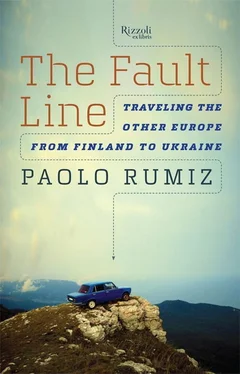Climbing on board makes me dizzy. It’s floating there in the void between the equally gray and horizonless sky and sea, and its tethering lines seem to be the only thing preventing it from taking off and flying away. “Sometimes the White Sea and the Northern sky blend into a single mass of light,” I had been advised on the way here. It’s true. It’s drizzling, cold, the lack of shadows has flattened all the features of the seascape, and today, boarding ship for the other world really does seem like a metaphysical experience.
“Wait here and don’t ask questions,” the woman at the ticket window on the wharf freezes me in my tracks. I had simply asked her if she could give me some information about the schedule, but in Russia questions often bring out the Homo sovieticus who sleeps in every public employee who works behind a window. The timetable says six o’clock, but, damn it, it’s now seven, and another passenger has heard that the boat will be departing at nine thirty, which inevitably will become ten. I calm down. No one on board is complaining. Time is suspended. The boards of the embarcadero are the same ones used by Stalin’s prisoners, and the village of Rabocheostrovsk comes peeping out of the mist: fifteen birchwood houses blackened by time. On a promontory, the chapel where they have just filmed Ostrow—The Island —perhaps the most beautiful film on spirituality and madness.
Fifteen years ago, the Solovetskys became monastery islands again, and their fame attracts throngs of sinners in search of grace—beggars, theologians, prophets, disillusioned businessmen, the gravely ill, mystics, and bamboozlers.
Standing on the dock is Viktor Ivanovich, Ukrainian, born in 1940, a gray overcoat and a forest of gray hair, a man who travels all the time, sleeping in train stations and hermitages. He looks me right in the eye like the prophet Elijah on the dock in Nantucket before the Pequod sets sail in search of the white whale.
“You are not Russian!” Then he explains: “Russians have the look of a martyred people, and you don’t have that look.” Then he takes flight: “God is good for bod y and soul, and I feel great. God is on my side and God is strength. Alcohol is death.”
Then, calm as can be, “There’s going to be a war, very soon, it will break out during the Olympics in Beijing. We don’t have much time.” I don’t take him very seriously, but he certainly seems sure of himself. He says everybody knows, in the monasteries, that something’s about to happen. He asks for a contribution for his ongoing pilgrimage. I hand him a few rubles. Then he goes on: “My life is in God’s hands, and God is not to be understood. God is to be felt, and I feel his presence. Since 1983 I’ve been living as a monk. Before I worked in Norilsk, where lumber arrived from half of Siberia to be exported.” I ask him if he’s ever been beaten up by some drunk young Fascist. He says no: “They’ve never thrown me out of a train station, where I spend my nights between one monastery and another. And I’ve stopped defending myself from violence. I don’t defend myself from anything anymore. I’ve forgotten how to do it.”
The wooden hotels next to the harbor, in one of which we spent the night, are tourist traps where the sacred is mercilessly profaned. Inside, techno music.
Outside, brutish shaved heads in dark suits and expensive cars. They’re the local gangster bosses. That’s obvious from the rooms in the cottages: Western prices for broken door handles, trashed toilets, showers that leak brown water. To escape from this underworld degradation, we stayed up late last night, walking around the area in a fiery light that inflamed the railroad tracks, the same ones that had brought dissidents sentenced to the Gulag to their destination. The wind carried such a strong smell of freshly cut birch trees that the whole of Karelia seemed to be lying on a bed of sawdust. We felt as though we were walking around a gigantic lumberyard.
Finally, we’re off. A long rumbling starts up, like a submarine. For two hours we are immersed in the luminous gray of a glass of anisette—a flat, oily sea.
Then, after the third hour, the onion domes of the kremlin, enclosed behind huge walls, flown over by formations of ducks, come out from behind the curtain, toward the bow of the main island. We’ve brought along an emergency backpack in case we decide to stay the night. We have toothbrushes, a knife and dried reindeer meat, pumpkin seeds, and a book of Russian fables. But it’s a tough choice. The Solovetskys are a place that steals your soul, where it’s better to stay a month or not to stay at all. We are inside a maze of churches and hostels for pilgrims, teeming with men and women dressed in black, and the maze rests on glacial masses so formidable that Mycenae and Machu Picchu don’t measure up.
In addition to this, the Solovetskys also manage to be Elsinore together with Constantinople. Denmark, Byzantium, and Siberia all rolled into one. Roman Catholics ought to come up here, to the sixty-fifth parallel, to see what faith means in the world of sunlit nights. I’m taking an exploratory walk around the perimeter of the walls. I did the same thing the first time I went to Jerusalem.
It’s a sort of courtship dance, a preamble. Monika has gone looking for monks inside the kremlin, which used to be a prison. I go wandering around with a pilgrim’s walking stick outside of the fortress, among lakes and beavers, browsing monks and cows, izba s, and grazed fields. The sun is shining now, and the windows of the massive perimeter bastions seem like watchful eyes. One especially, square with a pyramidal roof, which looks like a hat. It seems miraculous to me that orthodoxy, born in Byzantium, somehow found the strength to come all this way.
Wedges of ducks fly over the wood while the monks take their cows out to graze. But among the houses in the old village, I come across some cottages with English names: Welcome and Green Village. After the heroic years of the reconstruction of the monastery, we’re already in the package-tour era, and I’m afraid this place, still infused with spirituality, might decay even faster than Athos, the sacred mountain of the Greeks, disfigured now by internecine wars between the monks and by slush-fund scandals, not to mention the diabolical plague of cell phones, which has broken forever the prayerful silence. I stop at the edge of an inlet where the sea is as still as a lake. I slice a piece of dried reindeer and fraternize with an enormous cat who has sniffed the aroma of my snack.
I’m walking on an undulating terrain covered by a velvety green carpet and strewn with erratic boulders, struggling again, as I did among the Sami of the great North, with the sensation of passing through a world on the verge of extinction. In front of the weather station, I say hello to a passerby, and sure enough, she introduces herself: “Nadyezhda Leonova, voice teacher.” In Russia, don’t ever say hello to someone if you don’t have a few free hours on your hands, because that someone will respond to your greeting and will invite you to fraternize. Now that I’ve said zdravstvuitye to Nadyezhda Leonova, that’s enough for her to invite me into a shed where some monks are building a wooden boat.
It’s a historical replica of the Prepodobny Zosima , the Saint Zosima , the ship on which Peter the Great sailed here. She explains to me that the blessing ceremony will begin in just a few minutes.
So that’s how Monika and I were able to be in attendance at an extraordinary event, just the two of us along with the inhabitants of the Solovetskys. A monk enters the workshop, as gaunt as an icon, an effeminate voice, someone the wind would easily carry away. When he puts on his vestments, bright yellow, he is transfigured and unveils a quiet magnetic force. He utters a monosyllable and the onlookers hush. “That’s Herman,” one of the shipwrights says to me, standing stiffly at attention, “the man who, fifteen years ago, repopulated the islands and began the restoration of the monastery.”
Читать дальше












